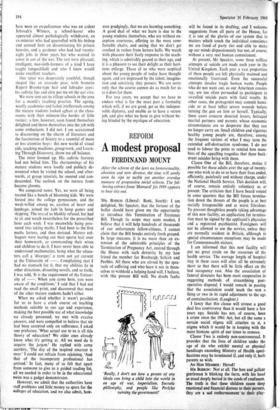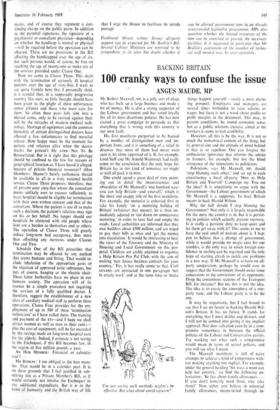A modest proposal
REFORM FERDINAND MOUNT
After the reform of the laws on homosexuality, abortion and now divorce, the time will surely soon be ripe to tackle yet another overdue measure of progressive social reform. The fol- lowing extract from 'Hansard' for 1984 appears to bear this out.
MR. BODKIN (Liberal: Bank, South): I am delighted, Mr Speaker, that the fortune of the ballot should have given me the opportunity to introduce this Termination of Existence Bill. Though its scope may seem modest, I believe that it will help hundreds of thousands of our unfortunate fellow-citizens. I cannot claim that the Bill breaks entirely fresh ground. In large measure, it is no more than an ex- tension of the admirable principles of the Termination of Pregnancy Act, steered through the House with such dexterity by my hon friend the member for Roxburgh, Selkirk and Peebles. All those who are stirred by the spec- tacle of suffering and who have it not in them- selves to withhold a helping hand will, I believe, wish this present Bill well. No doubt faults
Really, 1 don't see how a person of any ideals can bring a child into the world in an age of war, imperialism, Socratic philosophy, and people like Pericles running the government!' will be found in its drafting, and I welcome suggestions from all parts of the House, for it is one of the glories of our system that in Matters which touch the individual conscience we are freed of party ties and able to make up our minds dispassionately but not, of course, without a very real human commitment.
At present, Mr Speaker, some three million attempts at suicide are made each year in the United Kingdom. Each year a vast proportion of these people are left physically maimed and emotionally frustrated. Even the successful attempts involve tragic human waste. People who do not want out, as our American cousins say, are too often persuaded to participate in so-called suicide pacts with fatal results. In other cases, the protagonist may commit homi- cide or at least inflict severe wounds before turning the gun on him or herself. Typically, these cases concern deserted lovers, betrayed marital partners and parents whose economic circumstances are so desperate that they can no longer carry on. Small children and vigorous healthy young people are, therefore, among the frequent victims of what I may term the extended self-destruction syndrome. I do not need to labour the point to remind hon mem- bers of the appalling tragedies that these back- street suicides bring with them.
Clause One of the Bill, therefore, makes it possible for those adults over the age of twenty- one who wish to do so to have their lives ended, efficiently, painlessly and without charge, under the National Health Service. This decision will, of course, remain entirely voluntary as at present. The criticism that I have heard voiced in some quarters that the Bill forces termina- tion down the throats of the people is at best socially irresponsible and at worst frivolous. To prevent thoughtless people Wang advantage of this new facility, an application for termina- tion must be sigried by the applicant's physician and a registered psychiatrist. Foreigners will not be allowed to use the service, unless they are normally resident in Britain, although in special circumstances exceptions may be made for Commonwealth visitors.
I am informed that this new facility will put no great strain on the resources of the health service. The average length of hospital stay in these cases will after all be extremely short so that there will be little effect on the bed occupancy rate. Also the association of funeral directors has been most cooperative in suggesting methods of streamlining post- operative disposal. I would remark in passing that the association could teach the NUR a thing or two in its rapid adjustment to the age of containerisation. (Laughter.) I fancy that this clause will arouse a good deal less controversy than it would have a few years ago. Suicide has not, of course, been a crime since the 1961 Act, but all the same a certain social stigma still attaches to it, a stigma which it would be in keeping with the more humane spirit of our times to remove.
Clause Two is entirely non-controversial. It provides that the lives of children under the age of six who exhibit mental or physical handicaps exceeding Ministry of Health speci- fications may be terminated if, and only if, both parents so wish.
AN HON MEMBER: Herod!
MR BODKIN: Not at all. The hon and gallant gentleman is blinking the facts, with his head as usual deeply buried in the sands of confusion. The truth is that these children cause deep emotional and financial distress to their parents, they are a sad embarrassment to their play-
mates, and of course they represent a con- tinuing charge on the public purse. In addition to the parental signatures, the signature of a psychiatrist or consultant physician—depending on whether the handicap is mental or physical —will be required before the operation can be effected. There are no provisions in the Bill affecting the handicapped over the age of six, but such persons would, of course, be free on reaching the age of twenty-one to make use of the services provided under Clause One.
Now we come to Clause Three. This deals with the termination of seriously ill hospital patients over the age of sixty-five. I want to say quite frankly here that I personally think it a scandal that, in a supposedly progressive country like ours, so little thought should have been given to the plight of these unfortunate senior citizens and those ss ho must care for them. So often these poor folk sink into a blessed coma, only to be revived against their will by the miracles of modern medical tech- nology. Shortage of equipment and the common humanity of certain distinguished doctors have allowed a few unfortunates to find merciful release. HoW happy must be the moment for patient and relatives alike when the doctor marks the patient's file Nraa—Not To Be Resuscitated. But is it right that this privilege should be confined to the few for reasons of geographical location or, I have heard it alleged, because of private financial resources? (Hon Members: Shame!) Surely euthanasia should be available to all in a truly national health service. Clause Three proposes, therefore, that all persons over sixty-five whom the consultant deems unlikely ever to recover sufficiently to leave hospital should be eligible for termination with their own written consent and that of the consultant. Where the patient is too ill to make such a decision, the patient's relatives may sign on his or her behalf. No longer should our hospitals be cluttered with old people whose lives are a burden to themselves and to others. The operation of Clause Three will greatly redbce long-term bed occupancy, thus more than offsetting any increases under Clauses One and Two.
Schedule One of the Bill prescribes that termination may be effected by any method that seems humane and fitting. That would in- clude inhalation of the appropriate gases or the injection of approved toxic substances, but not, of course, hanging or the electric chair. These latter barbarities have no place in our humane society. The operation will of its essence be a simple procedure not requiring the services of a fully qualified doctor. I, therefore, suggest the establishment of a new class of auxiliary medical staff to perform these operations. Clause Four provides for the em- ployment of up to 500 of these 'termination technicians' as I have called them. The training and payment of the us—and I hope we shall attract women as well as men to their ranks— plus the cost of equipment, will be far exceeded by the savings made on long-term hospital care for the elderly. Indeed, I estimate a net saving to the Exchequer, if this Bill becomes law, in the region of five million pounds a year.
AN HON MEMBER: Financial or calendar }ear? • MR BODKIN: I am obliged to the hon mem- ber. That would be in a calendar year. It is on these grounds that. I feel justified in sub- mitting this as a Private Member's Bill, as would certainly not involve the Exchequer in any additional expenditure. But it is in the name of humanity and the British way. of Iife
that I urge the House to facilitate its speedy passage.
Ferdinand Mount writes: Strong all-party support can be expected for Mr Bodkin's Bill. Several Cabinet Ministers are reported !o be sympathetic to its aims but doubt whether it
can be allotted government tune in an already overcrowded legislative programme. MPs also question whether the limited resources of the NHS can be stretched to provide the necessary facilities. It is suggested in particular that Mr Bodkin's assessment of the number of techni- cal staff needed may he over-optimistic.



































 Previous page
Previous page